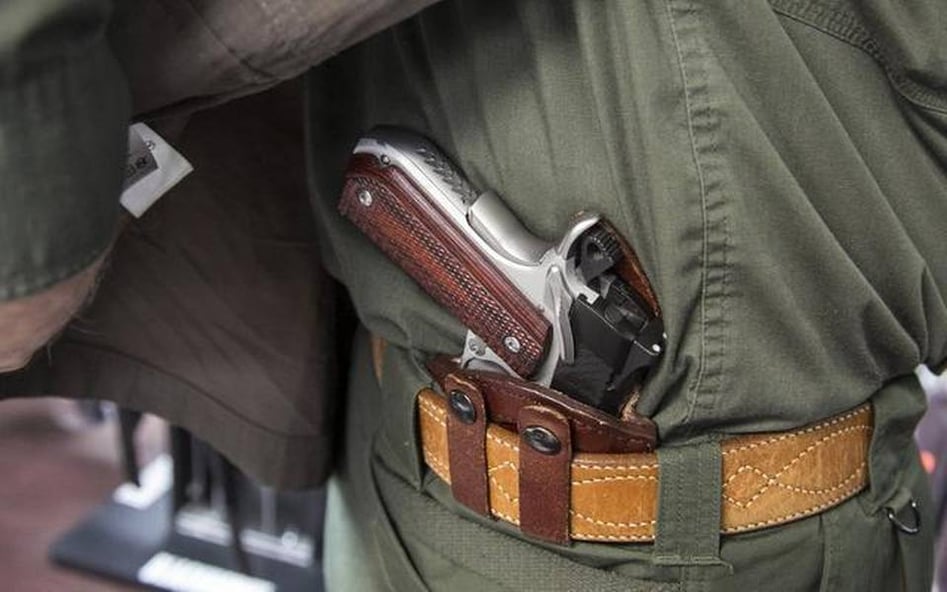When you started your job, you were likely excited to begin a new part of your career. When you walked through those front doors on the first day and “read” the entirety of the Employee Handbook prior, you were probably thinking more of when the first paycheck would arrive than whether or not carrying concealed was prohibited. Heck, you may not have even been a daily carrier when you started at your job.
But all that’s changed since you’ve become a daily concealed carrier. And now it’s time to check these simple things to ensure your company supports your right to carry concealed.
Check Your Company’s Signage
In many states, in order to designate an area “gun free”, signs have to be clearly posted. If your workplace doesn’t have those, or you aren’t working in a federal or state-mandated “gun free zone”, then you have no legal responsibility to reveal you are carrying concealed. Before you do – check out our handy reference further down in this article. Even if your specific workplace has provisions against this, you should still…
Check Your Employee Handbook
Inside your employee handbook should be every regulation that you are held accountable for. Everything from clothing attire, tardiness, and workplace behavior are usually governed in this monotonous, voluminous book. If you have an electronic copy, simply search (Ctrl+F) “concealed carry” or “firearms” or similar to see if there are any specific policies in place. There may be a way to be authorized to carry concealed through the course of your work.
And when in doubt…
Ask your Human Resources Department
There’s nothing wrong with inquiring as to the validity of carrying concealed so long as it doesn’t impede your work. For a lot of people who sit at a cubicle or conversely move around a warehouse-style setting, a concealed carry firearm is very possible.
For those working in electro-statically charged environments or laboratories, there may be specific restrictions in place for a reason. Certain conditions make carrying difficult, improbable, or outright impossible.
Once you have been given specific instruction, it’s your discretion as to whether or not to disclose that information to fellow co-workers, supervisors, or customers/clients. Generally, it’s recommended that if you are carrying a concealed firearm, you never disclose that information to other parties unless lawfully required to do so.
Does Your State Allow Employers To Decide?
Some companies have come right out and said they don’t support an employee’s right to carry concealed. Most states support this to some extent. Is yours one of them?
Note: Information is only meant as a reference, valid as of June, 2015, and only if you have a concealed carry permit (in states where applicable).
| State | Businesses Allowed to Prohibit Possession | |||
|---|---|---|---|---|
| ParkLot | Premises | Exceptions | Cited Law | |
| AL | No | |||
| AK | Yes | AS 18.65.700-.790, .800. | ||
| AZ | No | Yes | No | A.R.S. §§ 12-781, 13-3112. |
| AR | No | Yes | Yes | Ark. Code Ann. 5-73-101 |
| CA | No | No | * | Employer can conduct weapon search. |
| CO | No | Yes | No | C.R.S. § 18-12-214. |
| CT | No | |||
| DE | No | |||
| DC | No | |||
| FL | No | Yes | No | FSA § 790.251 |
| GA | No | Yes | O.C.G.A. §§ 34-2-10; 16-11-135 | |
| HI | No | |||
| ID | No | Idaho Code § 5-341. | ||
| IL | No | |||
| IN | No | Yes | Yes | I.C. §§ 34-28-7-2 and 34-28-8 |
| IA | No | Iowa Code § 724.4. | ||
| KS | No | Yes | Yes | Kan. Stat. Ann. 75-7c01 et seq |
| KY | No | Yes | Yes | KRS § 237.106; KRS § 527.070; KRS § 199.011; KRS § 199.894; KRS § 237.110(17); OAG 98-12. |
| LA | No | Yes | Yes | La. Rev. Stat. Ann. §§ 32:292.1 and 40:1379.3. |
| ME | No | Yes | Yes | 26 M.R.S.A. § 600. |
| MD | Yes | Yes | Yes | Md. Code Ann., Pub. Safety § 5-203. |
| MA | No | |||
| MI | No | Yes | No | MCL 28.425n. |
| MN | No | Yes | No | Minn. Stat. § 624.714, subd. 18. |
| MS | Yes | Yes | Yes | Miss. Code Ann. § 45-9-101 (licensing requirements and employer’s rights) and Miss. Code Ann. § 45-9-55 (employer’s parking l ot). |
| MO | Yes | Yes | Yes | RSMo. § 571.101. |
| MT | Yes | Yes | Yes | MT Code §§ 45-8-316 through 45-8-328. |
| NE | No | Yes | Yes | Nebraska Revised Statutes §§ 69-2427 – 69-2447. |
| NV | No | Yes | Yes | NRS 202.3653 through 202.369. |
| NH | No | |||
| NJ | No | |||
| NM | No | |||
| NY | No | |||
| NC | Yes | Yes | Yes | N.C. Gen. Stat. § 14-415.11 |
| ND | No | Yes | Yes | N.D.C.C. § 62.1-02-13. |
| OH | Yes | Yes | No | Ohio Rev. Code § 2923.126(C); Ohio Rev. Code § 2923.126(B). |
| OK | No | Yes | No | 21 Okla. Stat. §§ 1289.7a and 1290.22 |
| OR | No | |||
| PA | No | |||
| RI | No | |||
| SC | Yes | Yes | Yes | S.C. Code Ann. § 23-31-220. |
| SD | No | Yes | Yes | SDCL 22-14-11. SDCL 13-32-7. |
| TN | No | Yes | No | TCA § 39-17-1315 |
| TX | No | Yes | No | Texas Labor Code § 52.061-062 |
| UT | No | Yes | Yes | Hansen v. America Online, Inc., 96 P.3d 950 (Utah 2004), Utah Code § 53-5a-102, §§ 76-8-311.1, 76-8-311.3, and § 78A-2-20334-45-103 |
| VT | No | |||
| VA | No | |||
| WA | No | |||
| WV | No | |||
| WI | No | Yes | Yes | Wis. Stat. § 175.60(15m)(a) and (b) |
| WY | No | |||
| Source: BLR—Business & Legal Resources | ||||
So, some states can be heavily restrictive and yet still have exemptions. Utah, for instance, allows private business owners to restrict employees’ carriage onto the property – parking lot included. But for Federal and State employees, Utah doesn’t make those restrictions. Quite a big exemption, right?
While state laws may change with time, at present it seems most states support the employer prohibiting an employee from carrying a concealed carry firearm – permit or no.
What Now?
If your state supports your right to carry, work with your employer to see if you can expand or improve upon the existing policies.
What do you think about carrying concealed on the job? Tell us your stories in the comments section below.
DISCLAIMER: We are not lawyers, nor do we pretend to be. The information contained in this article is to be used for informational purposes only, and at no time should any content be considered legal advice. When in doubt, consult a lawyer.












![[READER QUESTION] Will My Guns Get Confiscated If I Seek Mental Health Treatment?](https://imagedelivery.net/sbm_lYeJbALkepJgtmRD5w/concealednation.org/2017/12/flew-over-the-cuckoos-nest.jpg/w=728,h=381)
![[BREAKING] GA Senate Passes Campus Carry Bill, Expected To Be Signed Into Law By Governor](https://imagedelivery.net/sbm_lYeJbALkepJgtmRD5w/concealednation.org/2016/03/Georgia-State-Capitol-Building-in-Atlanta-Georgia.jpg/w=728,h=381)
